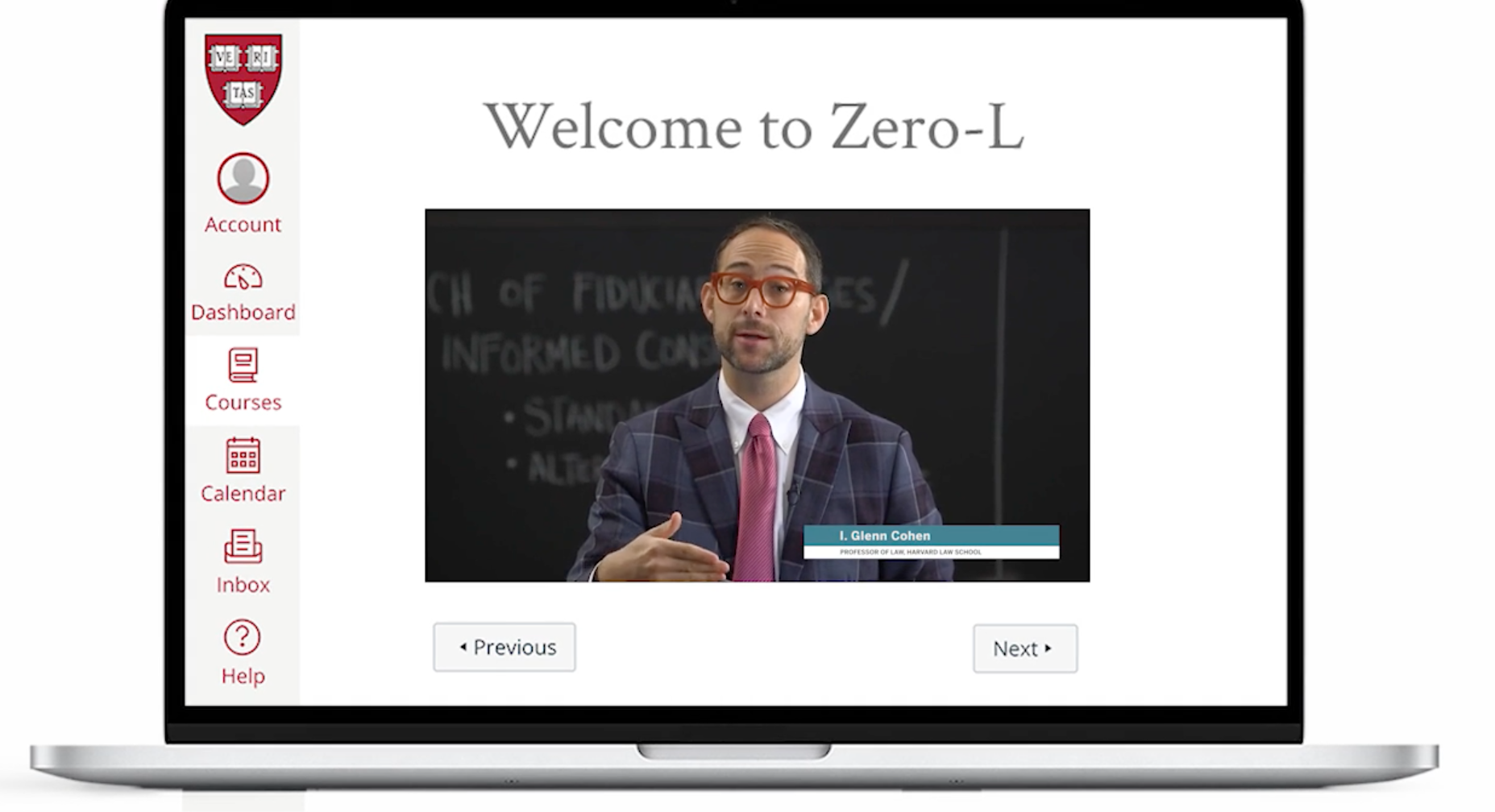Several years ago, Harvard Law School (HLS) administrators observed that the profile of incoming law school students was very different than it was even a decade ago. Students coming to HLS now reflected many different backgrounds and lived experiences, with many more having majored in a STEM field in college, spent four or more years in the workforce, or come to HLS from abroad.
In response, in 2018 HLS worked with the Harvard University Office of the Vice Provost for Advances in Learning (VPAL) to launch a new online, pre-term course called Zero-L—meant to ensure that all incoming students, whatever their backgrounds and previous areas of study, start with the foundational knowledge that will enable them to thrive in law school. (The name Zero-L is a play on the traditional terms for first-, second-, and third-year law students—1Ls, 2Ls, and 3Ls).
Taught by leading HLS faculty members, Zero-L has proven popular and effective with two years of incoming HLS students. In addition, last year, four partner law schools—Boston College, Northeastern University, Seton Hall University and the University of Baltimore—also successfully used the Harvard Law course to help support their incoming students.
Harvard Law School Dean John F. Manning ’85, a first-generation college graduate and law school student, knows from personal experience the importance of what a program like Zero-L has to offer. “When I arrived at HLS as a first-year student, I felt very much out of my depth in those crucial first weeks. I didn’t know the differences between state and federal courts, what the common law was, or even what a ‘litigator’ does for a living. Like a lot of other new law students, I felt that everyone around me ‘got it,’ and I just didn’t. We launched Zero-L to give incoming students from day one a common baseline of knowledge about the American legal system and about the vocabulary of law and to give them the confidence that they can succeed.”
Professor I. Glenn Cohen ’03, part of the HLS committee responsible for developing Zero-L, notes, “The learning curve at law school can be steep.” Zero-L was designed as an “on-ramp to help ease this transition; we want to ensure all law students have access to that on-ramp.”
Mara Chin Loy ’21, who majored in human biology and minored in Italian at Stanford, found the Zero-L class invaluable. “I was not very familiar with law school as a process,” she recalls. But by the time she arrived on campus, she felt well-prepared for her first semester. “I was able to fully focus my time on learning the material in my class, as opposed to spending a few weeks trying to figure out what was even going on,” said Loy.
Andy Boes ’21 majored in political science and economics at the University of Notre Dame, but he doesn’t come from a family of lawyers. “I didn’t have a lot of exposure to the legal world, other than the tangential academic exposure that you get through political science,” says Boes. Zero-L’s lessons gave him “a good foundation,” he says. “It made me feel a little bit more comfortable going into my classes.”
Although the School had originally planned to make the full version of Zero-L available this summer to other law schools for a fee, HLS will instead offer it this year for free to any interested U.S. law school to help them and their incoming students bolster student success rates and overcome COVID-related pre-matriculation educational challenges.
“This has been an incredibly challenging period for so many,” said Manning. “If Zero-L can help ease the transition and strengthen student success at other law schools as it has done at HLS, then we want to offer that support to all law schools by waiving the fee and making the course available for free this year.”
A self-paced course with optional comprehension checks, content is universal and flexible. Law schools can identify modules that are most useful for their students and instruct them to focus on those particular areas, such as the best approach to reading a case and the basics of American constitutional law.
“We designed Zero-L as a course that all law schools can benefit from by ensuring the content doesn’t focus on any institution-specific pedagogy,” said Jessica Soban ’07, associate dean for strategic initiatives.
For institutions facing the prospect of online orientation due to COVID-19, Zero-L also covers some critical elements of law school orientation, such as an introduction to the first year of law school, in an on-demand format that may complement a virtual orientation.
The self-paced course will now be accessible to participating law schools to offer to their incoming law students starting July 1, 2020, and is designed to be completed in 12 – 14 hours. Students can review Zero-L course material throughout their entire first year. All four partner law schools that used Zero-L last year have already agreed to participate again this year.
“Zero-L helps incoming 1Ls build a solid foundation and prepare to hit the ground running on day one of law school,” said Victoria McCoy Dunkley, assistant teaching professor and director of the Academic Success Program at Northeastern University School of Law.
“We are thrilled with the results,” said Dionne Koller, associate dean, professor of law and the director of the Center for Sport and the Law, University of Baltimore. “Zero-L enables us to connect with our incoming students in a way that both prepares them for law school and eases their nerves. The program provides an important supplement to our traditional orientation and directly serves our access mission.”
In addition to waiving the fee for Zero-L for the upcoming academic year, HLS and VPAL will make a portion of the course focused on American civics permanently available for free in July for all interested learners to view on HarvardX.
In the coming months, the HLS team will work with participating institutions to enroll them in Zero-L and ensure students gain access when the course launches on July 1.
